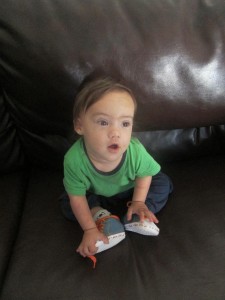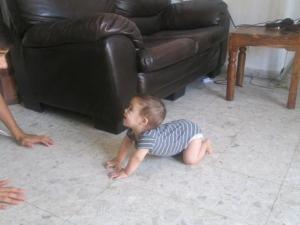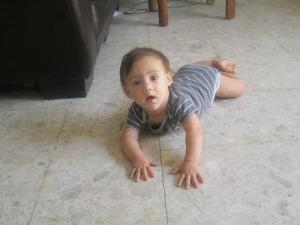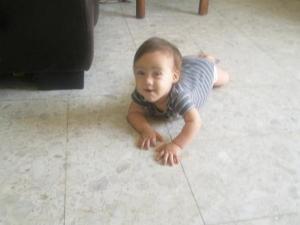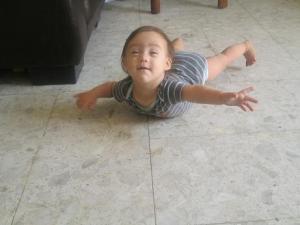Today is Day 28 of 31 for 21.

Grab This Button
A reader once asked why I am so open about Yirmiyahu on my blog and at what point this will change in order to respect his privacy.
When Yirmiyahu was diagnosed with Trisomy 21, there was no question to me that we’d be upfront and open with everyone from the very beginning. The two week period after his birth was hard for me primarily because we were waiting for results of genetic testing before sharing with others, and I wanted to be able to talk about it right away. Things become shameful when we hide them and act as if something is wrong, and while being born with a genetic difference is unusual, it’s not something to hide. It’s just how it is.
I don’t refer to any of my kids by name on the blog, and it was a ‘policy’ shift to share Yirmiyahu’s name here after his bris and to continue to use it. Calling him ‘the baby’ didn’t feel right. It felt like it was minimizing him, shunting him to the side. I grappled with this. I wanted to treat him as equal to our other kids and at the same time, I treated him differently here by writing about him by name. I asked myself if I was being hypocritical?
Here’s why I did this: because those with disabilities become invisible in our society. And to allow him to be like everyone else means that I have to work harder to acknowledge his presence in a world that says that children with T21 are a mistake, something to be ashamed of. That couldn’t be further from my truth.
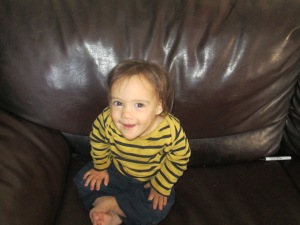
Being a supporter of inclusion and believing that those with disabilities should be supported in living a typical life, I’ve also asked myself if when I write about Yirmiyahu, am I defining him by his diagnosis by talking so openly about T21? Yes, I know he is different and it’s not me mentioning it that makes it so, but maybe it heightens the feeling of difference. Of maybe if I didn’t mention it, it would be the elephant in the room.
I don’t know for sure. These are questions I toss around in my head from time to time.
The biggest reason for writing about our Yirmiyahu is to remove some of the fear and unfamiliarity regarding having child with T21. It wasn’t that long ago when if I heard someone had a baby with T21, my feeling was pity for them and thankfulness that it wasn’t me. The idea of having a child who would look and act visibly differently was unpleasant for me. That was obviously before I knew that there’s so much more the same than different. Then when I was about four or five months pregnant, I ‘happened’ to read a blog of a mother with a daughter with T21. About that same time I began having very strong premonitions that my baby was going to have Down syndrome.
I’m sure Hashem put that blog in my path – it wasn’t at all connected to my life or interests at the time – to shift my perception of having a child with T21 before I was in that situation myself. Several months later, that made a huge difference in how I responded to the news a few hours after birth when we were told they suspected our new baby had Down syndrome. If I was still stuck in my old paradigm predating reading that blog, I have no reason to believe that I wouldn’t have been devastated when hearing the news, responding just as the vast majority of parents respond. There’s nothing different about me and them except that I was blessed with a paradigm shift before Yirmiyahu was born.

When we change our paradigms, it’s life changing. Literally. My decision to write about Yirmiyahu is in order to put a face on Down syndrome – a very cute face 🙂 – and to be part of a positive paradigm shift for some of my readers.
As far as his privacy, I try not to share anything about my kids that they might later be upset to read when they’re older; that’s my personal guideline.
Avivah

